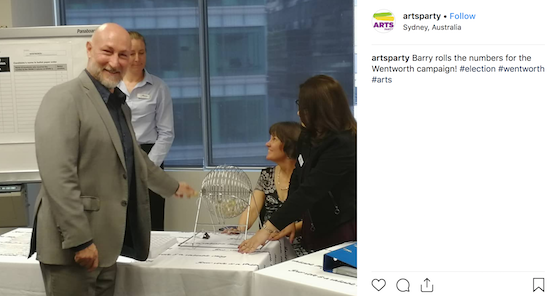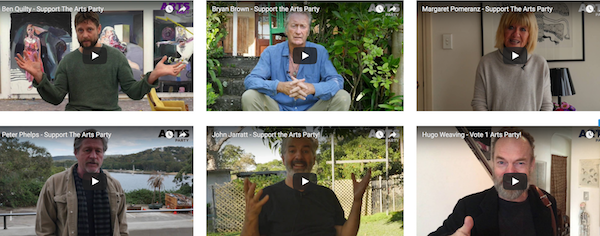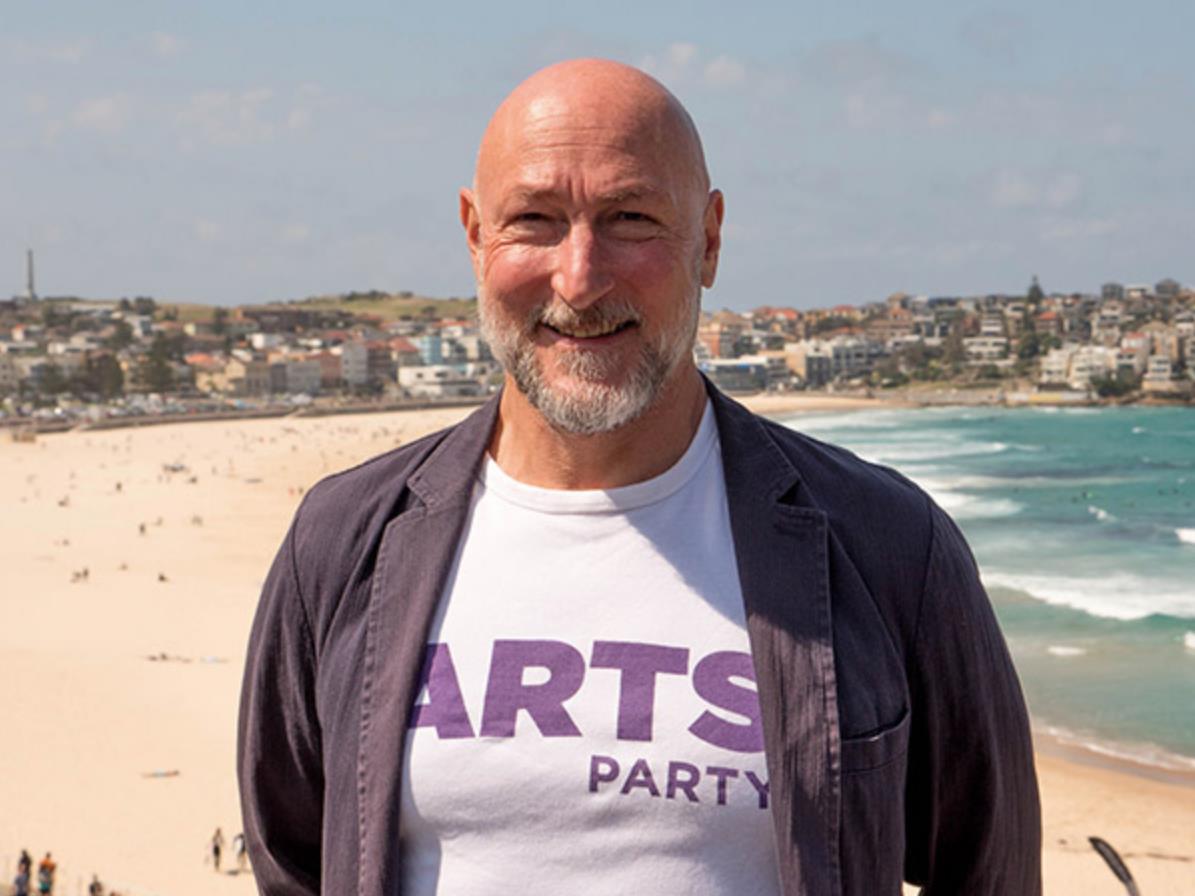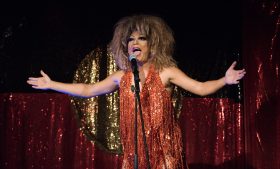Federal Leader of The Arts Party, Barry Keldoulis, campaigning in the Wentworth by-election. Image supplied.
The Wentworth by-election will be held on Saturday 20 October 2018. All eyes are on the Sydney seat as Liberal Party member and former Prime Minister, Malcolm Turnbull, steps down from politics.
The by-election has generated national attention, and – as The Arts Party candidate Barry Keldoulis points out – will be contested by a bumper number of candidates: 16 in total. ‘Most don’t live in the electorate,’ he noted.
‘One of the reasons I decided to run was because of the intense media coverage it was going to get. I wanted to raise awareness of The Arts Party,’ Keldoulis said.
The Arts Party, along with smaller issued-based parties such as Animal Justice, Sustainable Australia and Voluntary Euthanasia, are using the moment to capitalise the attention and take part in the national conversation.
The number of candidates is further proof that people have tired of big party politics, and want their vote count. Data shows that the Wentworth electorate has a strong interest in issues surrounding climate change and refugee detention, and that its residents are culturally engaged.
At the 2016 federal election, The Arts Party’s Senate candidates nationally received over 1.5 million preference votes, ranking them in the top half of 56 parties in the Senate results.
‘Arts and culture are noticeably absent from our political discourse. We want to work with all sides to get the best outcome for Australian arts and cultural industries and the Australian people. We’re playing a long game, but change is necessary and we are going to be that change for the better,’ said Keldoulis.
Keldoulis is the Federal Leader of The Arts Party, and a Bondi local. He said that one of the reasons he entered politics was to make people aware of how our preferential voting system works – to hand back that power to the people.
‘We are given no instruction at school how to vote. You can Vote 1 for a minor party and distribute your preferences as you wish – we don’t assign preferences as a party. So if you care about arts and culture, then you can send that message,’ Keldoulis said.
‘The major parties don’t care, they don’t think there any votes in the arts. By voting for The Arts Party you are letting the majors know that they just can’t use the arts anymore as a political football when it suits,’ Keldoulis said.
He reminded ArtsHub that the Liberal Party still has no policy for arts and culture.

Image courtesy The Arts Party
Turnbull clears the way, but is it a fair playing ground?
Keldoulis noted that a pre-election conversation to be held at Bondi Pavilion next week will only present four candidates – Liberal, Labour and two independents. ‘We weren’t invited to speak.’
He said a similar discussion, to be hosted by the ABC, also failed to invite The Arts Party into the Wentworth by-election discussion.
‘If people are prepared to stand they should be given a voice equally. It’s interesting the press are choosing to focus on who will win and the personalities of the four leading candidates – rather than issues,’ Keldoulis told ArtsHub.
This focus on issues comes at a timely moment, given recent sector developments.
The past weeks have seen the meddling of NSW Arts Minister Don Harwin in arts funding decision-making, with much-needed funding already allocated to independents and individuals redirected at Harwin’s demand to one of the major arts companies.
More recently, NSW Premier Gladys Berejiklian ignored Sydney Opera House policy and overrode CEO Louise Herron’s objections, in allowing the iconic world heritage building’s sails to be used for horse race advertising.
Keldoulis said that what stood out for him in the conversation of recent days was that those who objected to the use of the Opera House as a commercial billboard had somehow adopted an “elitist” position.
‘If this is the sort of language used to mould the political discourse, then it’s more important than ever before for people to have a voice through The Arts Party,’ he said.
‘People who care about arts and culture come from all parts of society. We are the world’s most egalitarian country. We are a young country making our culture, and we all have a say in that.’
Keldoulis said that up until the events of “the Brandis raid,” the arts had had a fairly bipartisan relationship with government.
‘It is really difficult for institutions to stand up to political interference when they rely on government funding … it’s the grassroots and avant-garde independents of the art world that are threatened – and it’s disturbing, the political drift away from arts funding,’ Keldoulis said.

There is a swell of support for The Arts Party from within the sector. Image courtesy The Arts Party.
Getting creative about policy
Policy doesn’t need to be complicated – it just needs to be real.
Keldoulis said that the Party was going to its members, and to arts connected people beyond the Party’s membership, between now and Christmas in order to refresh its policies ready for a potential May 2019 election.
‘It would be good to start by having a Minister for Arts and Culture as a sole portfolio, and to lift the engagement of the nation away from this art versus sport construct of the press and politicians,’ Keldoulis said.
‘People need to think of television, radio and film as culture in our everyday … Policies are not just about more money for the arts; it is more about integrating arts and culture into a wider spectrum of society. In terms of education policy, we would be aiming to go back to STEAM, and to address human creativity in our rapidly changing employment landscape,’ he added.
Keldoulis said the idea for The Arts Party started with a conversation in the pub in 2011. The Party was then crowdfunded into existence in 2014. The Party’s website describes it as a ‘non-political political party!’
Such a stance could be just what’s needed in a nation fed up with the shenanigans of politicians, where people are longing for vision, not self interest.
‘We are all engaged in politics in this country thanks to compulsory voting, and generally speaking most people are politically aware. Part of the problem of politics is that everything gets generalised. We can advocate by using our preferential voting system wisely to send a message,’ concluded Keldoulis.
There will be 40 polling booths across the Wentworth by-election on 20 October. To learn more about The Arts Party or how you can volunteer contact artsparty.org.au.





